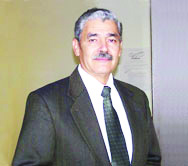Nick Aguilar: A Lifetime of Service
La Prensa San Diego Staff

When Nick Aguilar told his mother and stepfather he was enlisting in the United States Army rather than continuing his studies at Southwestern College, the news was not met with smiling faces.
This is how “Nick Aguilar: A Direction Home” begins. This documentary film produced by Shoestring Educational Productions features conversations between local historian Abe Shragge and Aguilar in which the Purple Heart recipient opens up about life in the military, his struggles with PTSD after discharge, and his career in public service after his duty in Vietnam.
Aguilar shared a DVD copy of this feature with La Prensa San Diego when initially contacted for a profile feature. While he politely declined an interview, Aguilar said the film was a good look into his life and allowed our staff to base a biographical article on the details the film narrates.
Born in a small town in the western state of Jalisco, Mexico, Aguilar arrived to the San Diego area with his family when he was just seven years old. During his school years, Aguilar excelled as a student at Sweetwater High School in National City.
While he enrolled at Southwestern College, Aguilar did not have a specific career path in mind and chose to sign up for the Army following his brother, who had voluntarily enlisted a couple of years before rather than having been drafted.
“After he left, I went to the downtown San Diego recruiting station and wanted to sign up to become a paratrooper,” Aguilar shared with Shragge in the documentary.
At the recruiting station, the agent filing Aguilar’s paperwork suggested he sign up for three years rather than four, adding that he can reenlist if he liked the experience.
“To this day I thank him,” Aguilar noted. “That was a major decision because if he hadn’t talked me into joining for three years instead of four I would have done two tours in Vietnam instead of one.”
“So I went back home and told my stepfather and my mother that I joined the army to become a paratrooper and both of them were very disappointed,” he continued.
Weeks after enlisting, Aguilar underwent basic training at Fort Gordon, Georgia and later shipped off to the outskirts of Saigon, where he would join the 173rd Airborne Division as a paratrooper and forward observer for a mortar platoon.
With the advent of live, on-location television broadcasts from during the late 60’s, the Vietnam War was the first armed conflict to be broadcasted into American homes and around the world as it happened. However, prior to Walter Cronkite’s live broadcasts and the eventual influx of coverage as the war dragged on, Aguilar did not yet have a frame of reference of the nature of war prior to seeing action.
“I had no idea what war was about,” he said.
While in duty, Aguilar would see the horrors of war up close. He recalls not being able to sleep for days after seeing his first dead body and while fighting in the Central Highlands of Vietnam, where he would also be engaged in some of the deadliest battles of the war.
After receiving a bullet in his shoulder after attempting to rescue a fellow soldier, Aguilar remained with his unit in a secure village through his recovery until he was given a month’s leave.
Shortly after, Aguilar returned to the tranquility of civilian life, which was unsettling for him as he could not relate to others anymore.
Despite this, Aguilar resumed his studies at Southwestern College and retook his course load with stellar grades, which lead him to an admission to UC San Diego during the Spring quarter of 1969.
Aguilar remembers his time at UCSD as an intense one, which coincided with the peak of the middle of the anti-war and civil rights movements.
During this time, he focused on creating equal education opportunities and addressing civil rights issues at the La Jolla campus. He specifically got involved in outreach for Mexican-American and African-American scholars and submitted proposals to start programs to reach out to these groups to increase enrollment of these minority students.
As a law student at UC Davis, he also continued his outreach efforts to Chicano students interested in law at what was then the newest campus in the UC system.
As Aguilar continued to resume his life and entered the world of law and public service, the scars of war continued to afflict him. He suffered from what was then known as an anxiety disorder — now known as post-traumatic stress disorder or PTSD — and also coped with civilian life through heavy alcohol use.
Not willing to take heavy doses of Valium to settle his mental state, Aguilar developed an exercise routine on a doctor’s recommendation and later quit alcohol when he noticed it was impairing his memory.
Over the years, Aguilar has served in a variety of leadership roles in the community. He acted as director of student policies and judicial affairs at his alma mater, where he introduced Veteran’s Day as an official holiday for the University of California system. He was a board member for the Sweetwater Union High School District, the Southwestern Community College District and the San Diego County Criminal Justice Council.
Aguilar currently lives with his wife Pat Aguilar in Chula Vista.


 Arturo Castañares
Arturo Castañares


